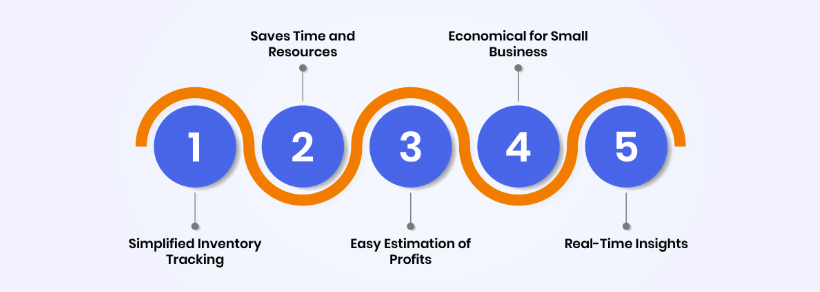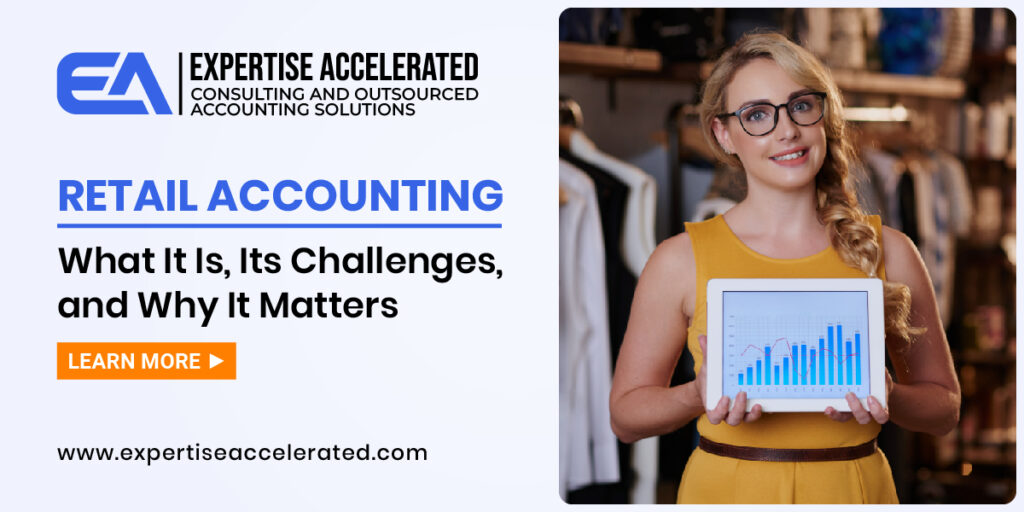Retail accounting is like the compass for retail businesses, guiding accurate financial reporting and efficient inventory management to stay on the path to success.
It streamlines the mind-bending processes that enable small businesses to track inventory and profit margins. As with any method of accounting, however, retail accounting, too, presents some challenges.
In 2025, retail accounting is shaped by key policies from the National Retail Federation, like tackling organized retail crime and reducing credit card fees.
In this blog, we will identify some essential benefits that arise from retail accounting, look into the current challenges retailers are facing, and discuss its importance in this competitive economy.
First, let’s see what retail accounting is.
What is Retail Accounting?
Retail accounting is a method used by retailers to value inventory. Unlike traditional accounting, it focuses more on managing inventory than calculating costs. Retail accounting estimates inventory value by assuming uniform pricing and consistent price changes. This simplifies calculations and reduces the need for physical stock counts. Retail accounting works best for businesses with stable pricing structures.
Benefits of Retail Accounting

Retail accounting has several benefits that make it an important tool for a business, especially in the fast-moving retail environments.
Simplified Inventory Tracking
One of the key advantages of retail accounting is simplicity. Rather than tracking the precise cost of every item, the system will permit a firm to compute the inventory values using retail prices and gross profit margins. This is especially useful for those retailers who have very high turnovers and maintain huge inventory.
Saves Time and Resources
Since retail accounting eliminates the need to perform complex calculations and update minute inventory details, time is saved from administrative work. Small businesses, in particular, benefit most from these time savings, because they cannot afford to spend resources on specialized accounting teams or software.
Easy Estimation of Profits
In retail accounting, profits can be estimated easily by adding the same percentage markup to inventory. This provides a top view of the retailer’s financial health without deep detail in cost analyses.
Economical for Small Business
Accounting for small businesses is always challenging because such companies are low on budget and capital. Retail accounting is cheap and thus does not demand for enhanced equipment, it is therefore a good choice for small businesses.
Real-Time Insights
Retail accounting enables organizations to control their stock and gross margin rates during the actual process. Decision making is easier since the firm is capable of preparing inventories, altering prices, or launching promotions.
Challenges in Retail Accounting

Despite its advantages, retail accounting is not without its challenges. Understanding these pitfalls will help in deducing whether this method meets your business requirements.
Incorrect Inventory Valuation
Since retail accounting depends on estimates, there is a great scope for error in the valuation of inventories. For instance, if the retail prices have changed due to discounts or promotions, then the estimated inventory value may not be the actual value of the stock.
Limited Precision
While retail accounting simplifies inventory management, it doesn’t offer the precision attributed to the more traditional methods of accounting. This makes any analysis of specific cost drivers a hard thing for the business to do, or profitability tracking at the level of an individual product.
Unsuitable for Complex Operations
The retail method of accounting works when products being sold have standard major markup percentages. However, for businesses with complicated pricing or a wide range of categories, the level of detail needed for the preparation of accurate and reliable financial reports might be unattainable through this approach.
Issues in Audits
One more challenge arising out of this adoption of estimates and averages is that from the viewpoint of audits, auditors will need to rely more on inventory cost for which detailed records generally are not maintained in the retail accounting systems.
Why Retail Accounting Matters for Small Businesses

Retail accounting holds sway over the success of so many small businesses. It is an attractive way where inventory can be maintained well and profits estimated. It is low-key and inexpensive. Adopting retail accounting will let the small business focus on growth and customer satisfaction, rather than get bogged down with complex accounting processes.
Supporting Growth in Competitive Markets
Small businesses mostly operate in highly competitive markets where efficiency and agility are at a premium. Retail accounting allows for quick decision-making and gives the small retailer an edge over their competitors.
Facilitating Cash Flow Management
For a small business, maintaining a healthy cash flow is very important. Retail accounting gives an overview of the inventory value along with the profit margin, which makes cash flow management efficient.
Reducing the Administration Burden
The small business owner often operates wearing many hats related to operations, sales, and finance. In this particular respect, retail accounting helps reduce the level of administration needed so that owners may put their energies toward strategic actions that include engagement with customers and marketing of the merchandise.
How to Overcome Retail Accounting Challenges

While retail accounting is fraught with challenges, businesses can adopt strategies to minimize its limitations and maximize its usefulness.
Use Advanced Software
Invest in advanced accounting software to bridge the gap between simplicity and precision. Modern tools enable tracking inventory costs, automating calculations, and generating comprehensive financial reports.
Make Reconciliations Routine
Periodically reconciling records against physical counts ensures accuracy and prevents discrepancies. This is particularly important during heavy sales periods or after significant price changes.
Observe Market Trends
Staying updated on market trends and supplier pricing helps businesses make relevant adjustments to retail pricing while maintaining accurate inventory valuations.
Mix and Match When Necessary
For businesses with diverse operations, combining retail accounting with conventional methods can offer the best of both worlds. For instance, retail accounting can be used for high-turnover items, while detailed tracking can be reserved for high-value products.
Practical Ways of Using Retail Accounting in Small Businesses
Here are actionable tips to help small businesses optimize retail accounting:
- Track Gross Margins: Regularly review gross profit margins to ensure effective pricing strategies.
- Audit Inventory Frequently: Conduct physical inventory counts to validate retail accounting estimates.
- Train Employees: Ensure staff understands retail accounting principles to avoid errors.
- Leverage Reports: Use accounting software to generate detailed reports that provide deeper insights into financial performance.
Conclusion
Retail accounting is accurate and inexpensive for managing stock and calculating anticipated revenues, thus suitable for retailers starting small businesses. However, it has some negative effects but with the right program strategies and technologies it can be reduced. Thus, evaluation of the strengths and weaknesses of retail accounting helps businesses establish business layouts and aims to meet their financial potential needed for long-term objectives.
Retail accounting is made easy using Expertise Accelerated. It saves time by automating tasks, freeing up your team to focus on clients. You can set up automated orders, get low-stock alerts, and track inventory in real-time. You may manage all of your financial tasks in one location, including wages and spending.
Join the Expertise Accelerated family today and let us streamline your company’s operations so you can concentrate on expanding it.

